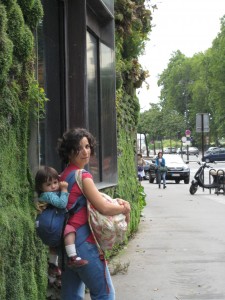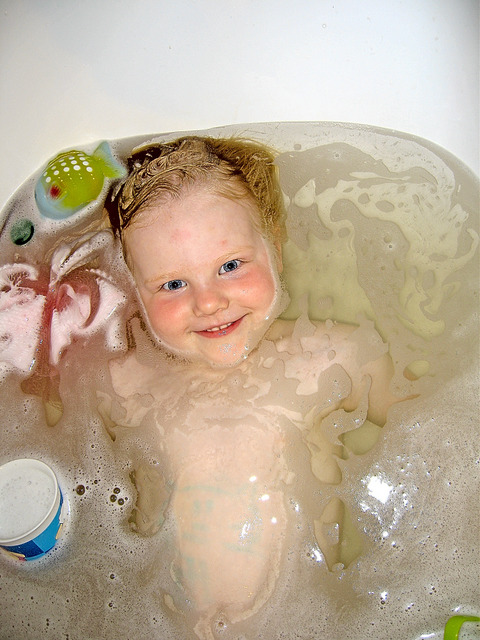
“Is that a baby in your purse?”
The question startles me as I check out of the grocery store with my newborn daughter tucked close to my body in a baby sling. I glance up at the woman ringing up my purchases, who is looking at me with nothing but friendly interest.
“Well,” I stammer, “Yes, she is my baby, but no, this is not my purse. This is a sling, a baby carrier.”
“Well honey, she looks real happy in there,” she says gently.
“Yes,” I agree. “I never go anywhere without my sling. My baby is so content in the sling that I am able to get out and get things done. She loves the sling and I love that she is peaceful.”
We both seem pleased with the conversation and exchange a smile. She chuckles and adds warmly, “That spoilt little thing. She knows a good thing when she sees it.”
Indeed.
I love hearing people’s feedback when I am out and about with my little ones in tow. Over the past eight years, I have worn each of our four children in a soft baby carrier as I go about the business of life, a practice coined “babywearing” by Dr. William Sears. I do not “wear” my babies on principle, even though as an MD I do know of the benefits of wearing a baby in a soft carrier (for example: reduced crying, improved breastfeeding rates, improved sleep, better attachment and improved parental responsiveness).
No, I wear my baby because it makes her happy like nothing else in the world (except maybe nursing) and when baby is happy, I can feel that she is sorted out and I can focus on other things. This is a sanity saver.
Inadvertently, I have become an unofficial ambassador for babywearing. By merely appearing in public with my baby contentedly riding in a sling, I have received many curious stares and many generous comments. Mostly, people notice first how happy my baby seems and how she never cries. Sometimes they wonder aloud if I am spoiling her.
Comments from folks who are either expecting or juggling small babies of their own are often frankly envious. “Wow,” they say, “your baby is so happy. You are so lucky. Did you make that? Where can I get one?” I am always happy to take a moment and talk shop. Yes, she is happy. Yes, I am lucky. But you can be, too. I tell them how having a sling has made my life easier and I show them how to use it and where to get one.
But I also value the interactions with folks who are not necessarily currently tending an infant of their own. They often sigh wistfully and say “I wish they had those around when I had my own babies.” Or a favorite of grown men, “I wish someone would carry me around like that!” Um. OK. The comments are always positive, they notice how happy and easy my baby is and they remark on it. But they also usually want to know: Why use a sling instead of a car seat? (simple, she hates the car seat) and Gosh, isn’t she squashed? (Well, not as much as she was in her previous living situation) and Gee, aren’t you worried about spoiling her? (see below).
As it turns out, babies are some kind of clever creatures. Yes, babies want to be held, but it goes deeper than that. Studies show that biologically, babies need to be held in order to thrive. A review of current randomized controlled trials suggest that the benefits of holding for preterm babies include shortened hospital stay, decreased illness, higher exclusive breastfeeding rates/longer breastfeeding duration, increased weight gain, improved temperature regulation, and improved maternal sense of competence. Evidence-based benefits for full term babies include improved state organization and motor system modulation; improved temperature regulation; and an analgesic effect, reduced crying, improved maternal responsiveness, and babies who were more securely attached.
In our arrogance, we assume that we have created the need to be held by holding our babies, when in fact babies are born hardwired to seek out that which they need to thrive: food, warmth and human touch. We cannot spoil a baby by meeting their basic needs.
So the next time you see a “lady with a baby in her purse,” smile at her and know that she is doing what she can to keep her baby happy, meet her baby’s needs and tend to her own in the process. She is busy mothering in the best way she knows how. She is the next babywearing ambassador.
This article was written to encourage community support for babywearing in preparation for International Babywearing Week this November 12-18.




